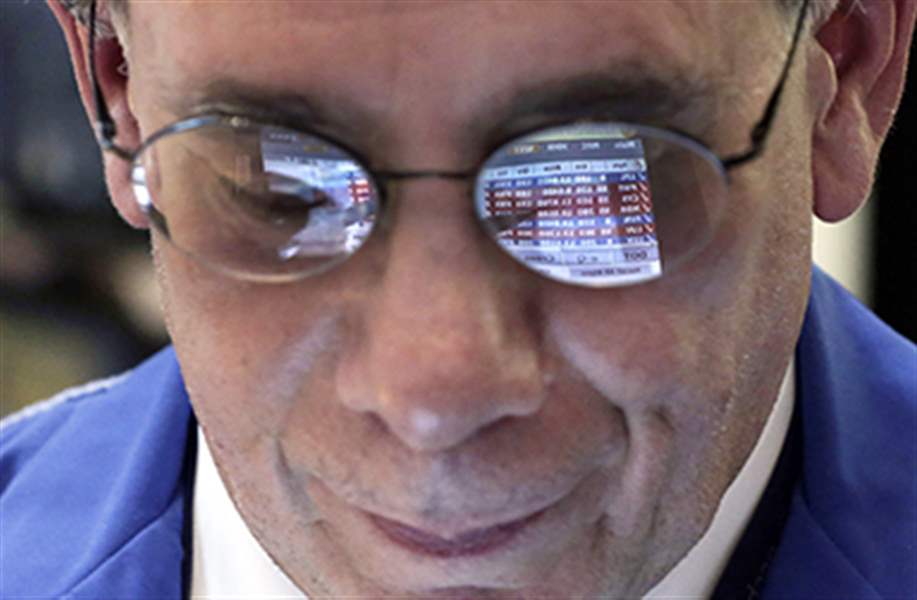
Stocks soar to dizzying heights, U.S. skirts default
12/29/2013
Trader Sal Suarino’s glasses reflect numbers on the New York Stock Exchange, where the Dow set a record in March.
ASSOCIATED PRESS

Trader Sal Suarino’s glasses reflect numbers on the New York Stock Exchange, where the Dow set a record in March.
NEW YORK — It was an easy year to emulate Warren Buffett even as Congress almost wrecked the economy.
U.S. stocks rocketed to new heights, and markets in Japan and Europe jumped too. The gains enriched investors and defied a still-subpar economic rebound from the Great Recession.
Budget fights closed much of the U.S. government for 16 days. Leaked classified documents showed that the National Security Agency collected private online communications via Internet companies. The disastrous rollout of President Obama’s health-care law confirmed fears of a bureaucratic train wreck.
JPMorgan Chase paid a record $13 billion for its role in the housing bust. General Motors Co. LLC flashed signs of its old horsepower. A colossal merger for American Airlines Inc. and US Airways took flight. Twitter Inc.’s IPO recalled the dizzy dot.com era. And the heartbreaking deaths of 1,100 garment workers in Bangladesh showed that some overseas factories serving U.S. companies remain unsafe.
Here are the top business stories of 2013, as chosen by business editors at the Associated Press.
● STOCK MARKETS SURGE: The Dow Jones industrial average set a record in March and hardly stopped to celebrate. The blue chip average has soared roughly 25 percent so far, its best performance in a decade.
The Federal Reserve’s bond purchases helped cut long-term interest rates, making stocks more alluring than bonds. Also, companies boosted share prices through an unusually large $751 billion in stock buybacks. And corporate profits achieved a record share of the U.S. economy.
● FEDERAL CHAOS: Congress nearly derailed the economy — not once but several times. Lawmakers allowed a Social Security tax cut to lapse after Jan. 1, which shrank Americans’ paychecks. Then they let deep federal spending cuts take effect in March because they couldn’t agree on a budget. The dysfunction peaked in October: Unable to pass a 2014 budget, Congress shut down part of the government for 16 days. The government even risked a default on its debt until, with just hours to spare, Congress reopened the government and by December forged a two-year budget deal.
● TECH COMPANIES AND NSA: Big Brother has logged on. The U.S. government gathered data on online messages through a program that’s intended to stop terrorism but that touches the communications of ordinary Americans. Internet companies already track users and then sell customized digital advertising. But they were indignant after documents leaked by a former NSA contractor said the agency had backdoors at Google Inc., Yahoo! Inc., Facebook Inc., Apple Inc., and Microsoft Corp.
● JPMORGAN CHASE: The biggest U.S. bank agreed to pay $13 billion for its part in the housing frenzy that sparked the financial crisis. The pact dwarfed the previous record settlement with the government: $4 billion against BP for its 2010 oil spill.
● HEALTH-CARE LAW: The medicine didn’t go down smoothly when the new health-care law launched in November. It was almost impossible for uninsured individuals and small businesses to sign up on the glitch-ridden federal Web site. The Obama Administration swung into emergency mode but businesses would need to enroll with paper applications until November, 2014. The plans offered online also drew sour reviews. Premiums rose for some small businesses. Others were unhappy with the limited plans and doctor networks. But some businesses were spared the mess. Before the launch, the government delayed until 2015 the mandate that companies with more than 50 employees provide health coverage or pay penalties.
● CENTRAL BANKS GO LOW: The Fed and other central banks supported growth by keeping rates ultra-low. Investors, home buyers, and corporations benefited. But many who depend on income from savings accounts suffered. The Fed decided in December to pare its bond-buying program but will do so gradually.
● BANGLADESH FACTORIES: Cheap jeans and T-shirts come at a human cost. In April, a building in Bangladesh that housed garment factories collapsed and killed more than 1,100 people. The tragedy pressured clothiers and retailers such as Wal-Mart, the Gap, and H&M to upgrade their working conditions in that nation.
● AIRLINES MERGE: American Airlines emerged from bankruptcy with a bang — merging with US Airways to form the world’s biggest airline. The new American Airlines Group handles 6,700 flights a day to 339 destinations. The combined company will likely operate as two carriers for two years.
● TWITTER IPO: The business of 140-character blast communiques thrilled Wall Street. Twitter went public in November at $26 a share; the price since has more than doubled. It was among 222 IPOs this year, the most since 2000.
● GM COMEBACK: Just six years ago, GM — and, by extension, much of the U.S. manufacturing base — needed taxpayer life support. But the automaker has roared back. The Treasury Department unwound its stake in GM this year at a $10.5 billion loss. But the government rescue saved more than 1 million jobs and helped return once-dominant GM to profitable health. GM now boasts $26.8 billion in cash, $1.3 billion to upgrade five Midwest factories, and a new CEO: Mary Barra, the first female head of a major U.S. car company.